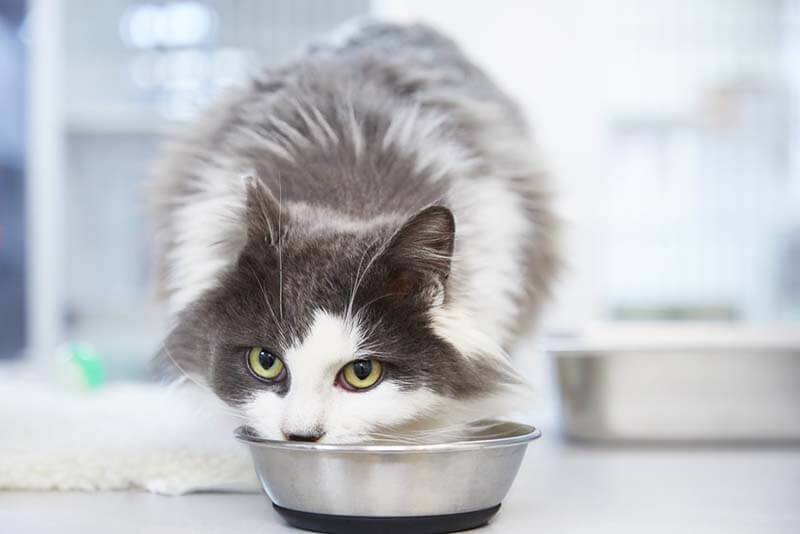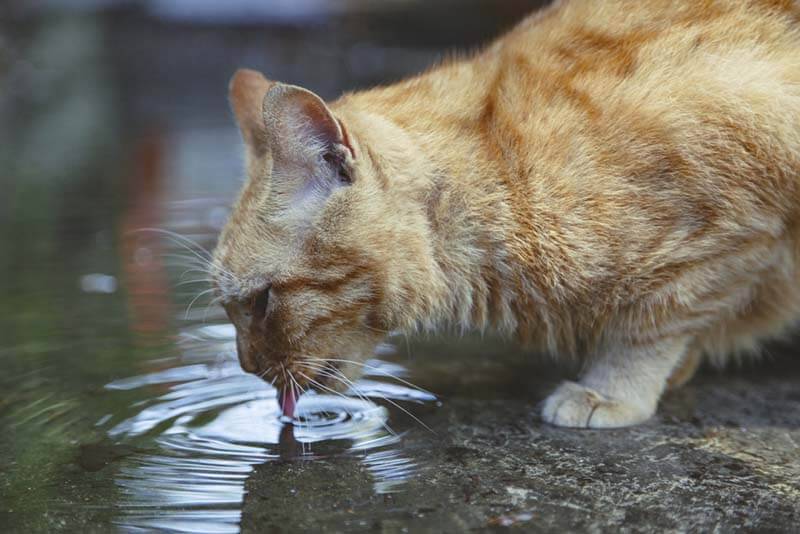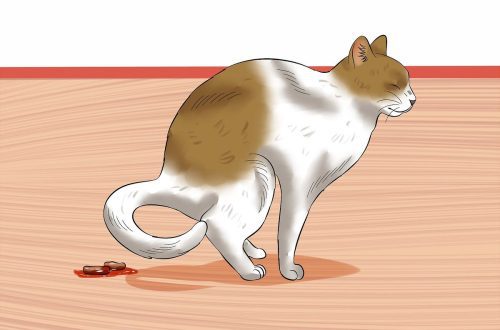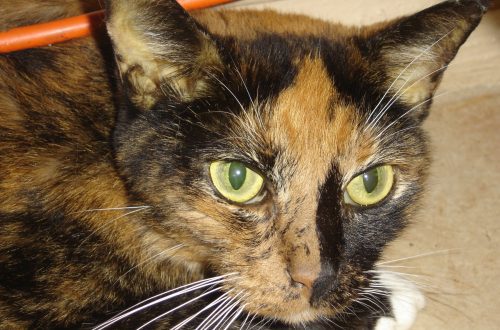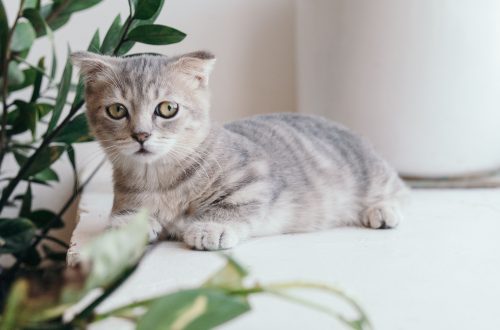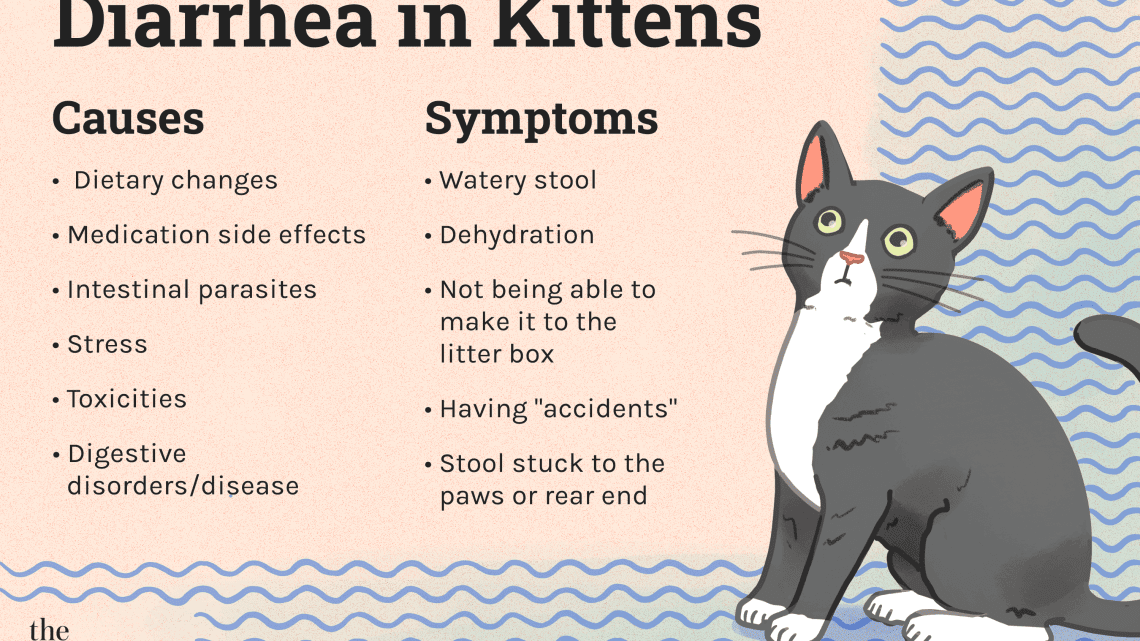
Diarrhea in cats – what to do and how to treat?
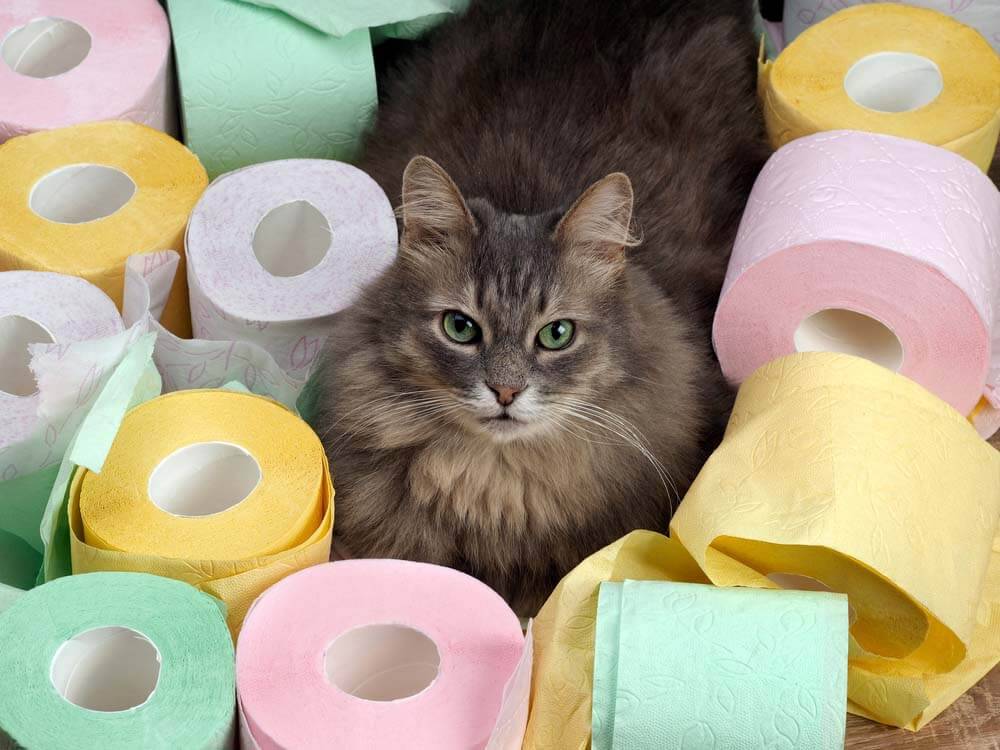
Contents
- Loose stools in cats – the main thing
- Symptoms of diarrhea
- duration of diarrhea
- Causes of diarrhea in cats
- Loose stools in kittens
- Features of diarrhea in pregnant and lactating cats
- Different manifestations of diarrhea in cats
- Diagnosis of loose stools in cats
- Treatment of diarrhea in cats
- Prevention
- Answers to frequently asked questions
Loose stools in cats – the main thing
Loose stools are not a diagnosis, but a symptom. The first step in treating a cat is to determine the cause of the diarrhea.
The main causes of loose stools include errors in feeding, parasitosis, infections of the gastrointestinal tract, diseases of the internal organs and the endocrine system, and oncology.
Treatment is based on the data of the examination and examinations.
With a good general condition of the animal, excellent appetite, absence of vomiting and dehydration, symptomatic treatment can be prescribed.
Symptoms of diarrhea
The fact that the pet has diarrhea, the owners always notice on their own at home. In the tray, you can find unformed feces of various colors with any impurities in it. Feces are mushy or completely watery. Color can be brown, yellow, green, black. From impurities there are whitish flakes, blood, mucus and even parasites. The frequency of defecation can be different: from once a day to 10 or more. In case of serious deviations in health, there will also be noted: lethargy, refusal to eat, vomiting, high or low body temperature, pain in the abdomen. So the main symptoms are:
increased frequency of bowel movements per day;
change in the consistency of feces to more liquid;
discoloration of feces and the appearance of impurities in it;
vomiting, refusal to eat, lethargy, changes in body temperature, pain.
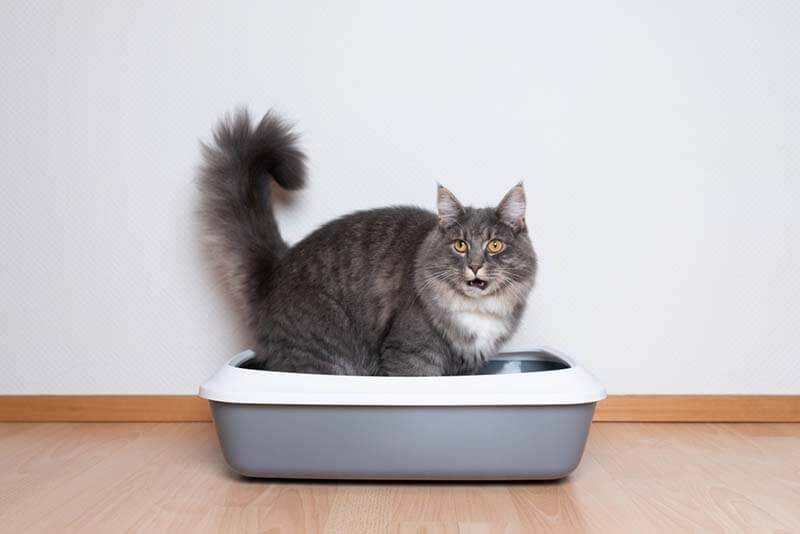
duration of diarrhea
There are 3 types of diarrhea in cats:
1. Sharp
Acute diarrhea is characterized by an abrupt onset of symptoms. In appearance, a healthy animal suddenly begins to go to the toilet in a liquid way, defecation becomes more frequent from 5 times a day or more. The chair is liquid or completely watery, often with blood or flocculent impurities. The condition of the pet may be depressed, he refuses to eat, lethargic, hides in the corners, vomiting may join the symptoms. The cause is often food poisoning, infections of the gastrointestinal tract, inflammation of the pancreas, liver and gallbladder. Diagnosis of diarrhea should be carried out as early as possible – before the onset of irreversible consequences. Symptomatic treatment in the form of intravenous droppers is prescribed immediately upon admission to the clinic.
2. Chronic
Chronic diarrhea in a cat at the onset of the disease is most often not accompanied by a deterioration in well-being. Owners note liquid or mushy stools 1-2 times a day, but the pet behaves as usual. If help is not provided for a long time, the cat may begin to gradually lose body weight, sleep more and play less. There are many causes of chronic diarrhea, but the following can be distinguished:
parasites in the gastrointestinal tract;
food intolerance;
diarrhea responsive to antibiotics;
diarrhea responsive to steroids;
Addison’s disease;
hyperthyroidism;
exocrine pancreatic insufficiency;
neoplasms (eg, lymphoma).
Treatment for chronic diarrhea often involves a trial treatment. That is, against the background of any drugs, an improvement should occur, which will indicate a correctly diagnosed diagnosis. Sometimes, in the diagnosis of such conditions, a histological examination of the affected intestinal wall is used.
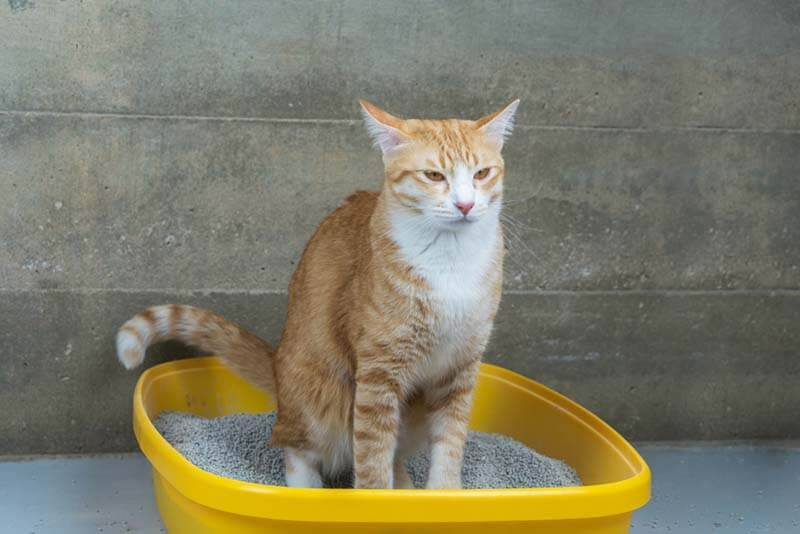
3. Periodic diarrhea
This type of diarrhea is characterized by the fact that the owners do not notice it all the time, but only once every few days or even less often. The general well-being of the pet does not change, there is no refusal to eat, weight loss and other things. One of the most common causes is considered to be a coronavirus infection in cats.
Causes of diarrhea in cats
The cleanest reason why a cat vilifies is feeding errors. The following factors can lead to poor stool quality:
Abrupt change in diet
If a pet is accustomed to eating a certain type of food for quite a long time, it is better not to change his diet without a good reason. With a sudden change in food manufacturer, the cat’s stomach may not have time to adjust to the changes. There will be diarrhea. The same is true with the abrupt transition from ready-made dry food to homemade food, and vice versa.
Unbalanced feeding
Industrial ready-made feeds are compiled by nutritionists and contain a certain amount of all the nutrients necessary for life (proteins, fats, carbohydrates, vitamins, minerals). A natural home diet should also be formulated based on the needs of the cat. It is almost impossible to carry out such work on your own, therefore, the home diet often turns out to be unbalanced and unsuitable for the quality life of the animal. As a result, often against the background of this, diarrhea occurs.

Too large portions or very frequent feeding
Overeating is another possible cause of diarrhea. Most cats can regulate the amount of food they eat on their own, but some individuals will eat whatever is offered to them.
spoiled food
It is necessary to carefully monitor the terms and conditions of storage of feed. Expired food should not be fed as it can lead to severe poisoning. Also, food should be stored closed, away from sources of heat, light and moisture. It is recommended to store dry food in its original packaging, and for reliability, put this packaging in a special jar or container for food. Open canned food should be transferred from a can to a glass container and stored in the refrigerator. In no case should food be stored open or left for a long time in free access for the cat. In the open air, fats are oxidized in the feed, vitamins deteriorate.
Polluted drinking water
To quench your pet’s thirst, you must use only clean water, boiled or filtered. Various impurities in the water, such as chlorine, metals, bacteria and fungi, can lead to animal diseases and, as a result, to diarrhea.

Individual intolerance to any product
It also often happens that the body of some animals is not able to absorb a particular food product, most often protein (chicken, beef, fish, milk, etc.). This will be manifested by chronic diarrhea, and is treated only by the exclusion of this product from the diet.
The second most common cause of loose stools is parasitosis of the gastrointestinal tract. Parasites include helminths and protozoa. Of the helminths in cats, flat (Dipylidium caninum) and round (Toxocara cati) worms are most often found, but infection with other types of helminths is also possible. Of the diseases caused by protozoa, giardiasis, coccidiosis, and trichomoniasis are usually found.
In addition to errors in the diet and parasitosis, there are many other reasons for the occurrence of loose stools. Infectious diseases such as feline panleukopenia, clostridium, salmonellosis are common. Systemic diseases, for example, pancreatitis, hepatitis, cholangitis, cholecystitis, foreign body of the intestine, intussusception will also in some cases be manifested by diarrhea. Most likely in such cases, in addition to diarrhea, there will be other symptoms – lethargy, refusal to eat, vomiting. The causes of chronic diarrhea include endocrine, inflammatory bowel disease, oncology.
Loose stools in kittens
Having diarrhea in a kitten can be more dangerous than in an adult cat. Together with the watery stool, the animal loses precious fluid from the body. Severe dehydration in small kittens leads to a deterioration in the performance of all organs and systems, death is possible even during the first day. Common causes of diarrhea in kittens are malnutrition, parasites, and infections.
There is also the so-called “toxic milk” syndrome. If a mother cat has some kind of disease, then the kittens who drink her milk may get sick. If the kitten has a single diarrhea and it is not accompanied by a deterioration in the general condition, you can start treating it with enterosorbents, for example, Smecta, Polysorb, Enterosgel. In all other cases, you need to visit a doctor to make a diagnosis and select the right treatment.
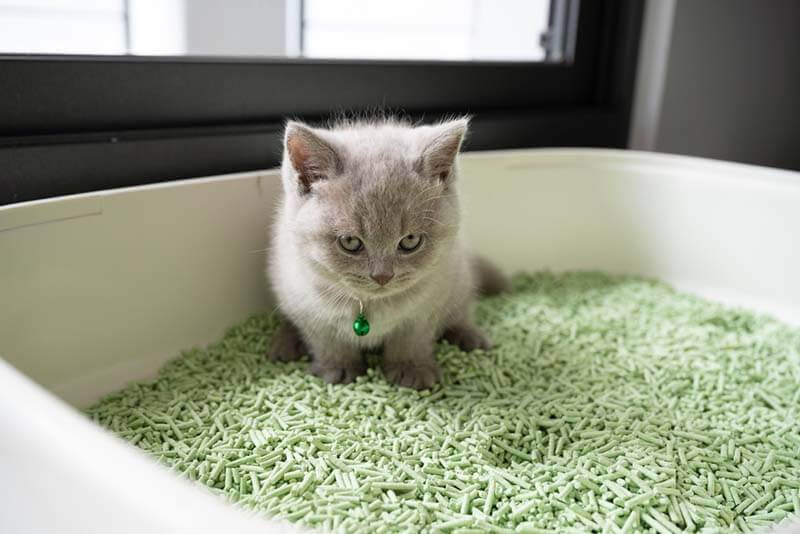
Features of diarrhea in pregnant and lactating cats
Diarrhea in pregnant cats is often caused by malnutrition. A pregnant cat needs a change in diet, she needs more high-calorie food with an increased amount of protein in it. Of the ready-made diets for expectant mothers, kitten food is recommended. Such feeds cover all the nutritional needs of a cat mother. On the contrary, a pregnant cat does not need milk in the diet, it can weaken the stool, but it does not carry any nutritional value.
Before planning the offspring by the owners, the cat and the cat must be checked for infectious diseases, as well as be treated for helminths and vaccinated. Illness during pregnancy can cause great harm to future offspring. Pregnant cats should not be given many common medications and can be difficult to treat. If a nursing cat is poisoned by spoiled food, then she can transfer toxins to kittens along with milk. Infections and parasites will also inevitably be passed on to offspring. Therefore, the observation of a pregnant and lactating cat should be very careful, if you have any questions, you should consult a doctor.
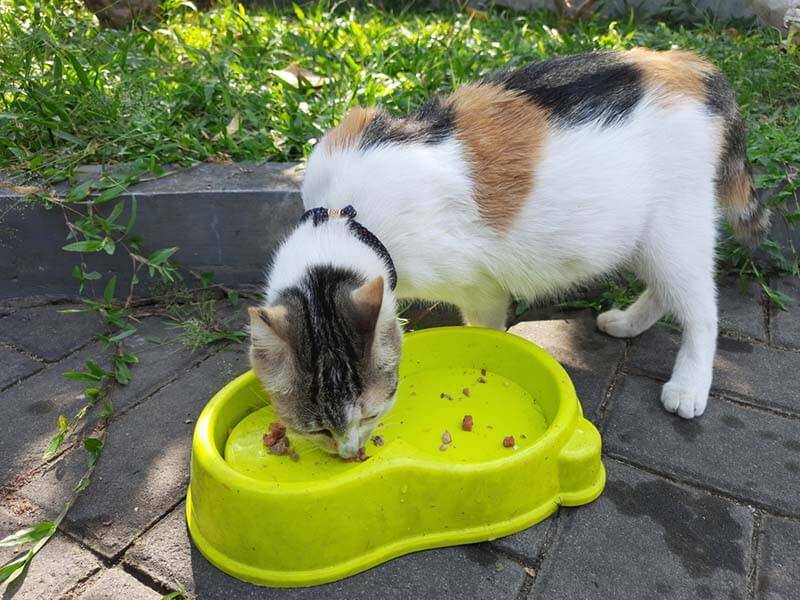
Different manifestations of diarrhea in cats
With green or white stool
Liquid green stools can be in cases of a foreign body in the gastrointestinal tract and intestinal intussusception. These diseases are a serious indication for surgery, their independent resolution is almost impossible. White stool is rare. This is possible with a blockage of the biliary system, since it is bile that gives the brown color to the feces. Here it is necessary to clarify the cause of the blockage, but it is likely that surgery will also be the solution.
Diarrhea in yellow cats
Yellow diarrhea can be due to improper feeding, especially often this happens if you give your pet milk. Lactose is poorly digested in animals. Also, yellow diarrhea can be caused by poisoning with spoiled food, a sharp change in diet. With an increase in the level of bilirubin in the blood, the feces can also turn an intense orange-yellow color. This happens with hemolysis (destruction of red blood cells), diseases of the liver and gallbladder. Clinical and biochemical analyzes will help to understand what is happening.
Diarrhea in cats with vomiting
At the same time, vomiting and diarrhea can be with poisoning, gastroenteritis, liver diseases (hepatitis, cholangitis), gallbladder (cholecystitis). Also in this case, it is worth suspecting an infectious process. Panleukopenia is quite common in unvaccinated cats. This is a severe viral disease of the gastrointestinal tract, the main symptoms of which are acute diarrhea and vomiting. If the pet has vomiting and diarrhea, you should immediately contact the clinic to diagnose the condition and receive the necessary treatment.
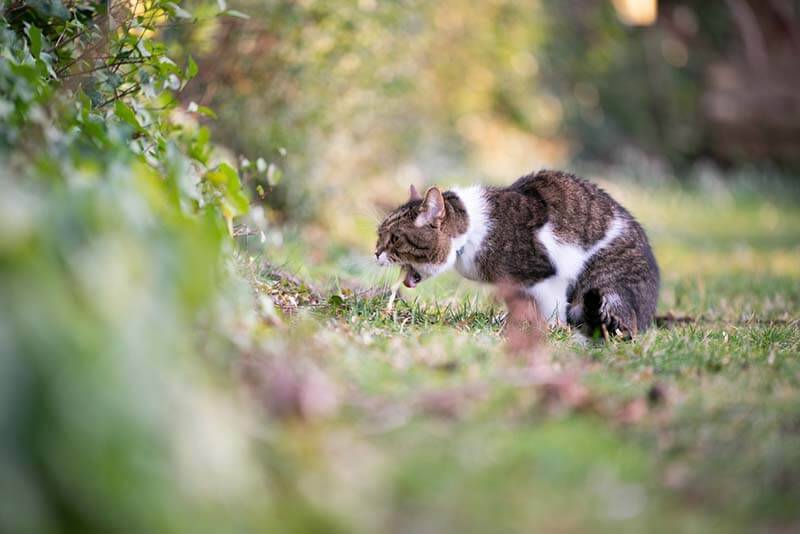
With blood
Most often, blood impurities in the stool appear due to rupture of the capillaries of the large intestine. This happens if the pet is pushing hard with diarrhea. Also, blood in the feces can be with such an infectious disease of cats as coronavirus gastroenteritis. Usually this does not cause serious harm to health, but it is still recommended to carry out routine diagnostics. Neoplasms in the rectum can be injured during bowel movements, which will lead to blood impurities in the stool. If there is a lot of blood in the stool, it is scarlet in color and simply flows from the priests, there is a risk of severe bleeding, for example, after an injury. This is also possible when a cat is poisoned with a rodent baiting agent – it does not allow blood to clot normally and causes bleeding in all internal organs. This condition requires emergency hospitalization with a cautious prognosis.
With slime
Mucus is produced by the goblet cells of the intestine, most of which are found in the large intestine. Mucus helps form feces and allows them to pass easily through the digestive tract. With inflammation of the large intestine, too much mucus begins to stand out, and we see it in the feces with the naked eye. Often this happens in the presence of parasites: helminths or protozoa. If the general condition of the animal is not changed, you can independently carry out preventive treatment from parasites. If there is no improvement, it is necessary to contact the clinic, conduct research and choose a treatment.
diarrhea with water
Profuse diarrhea, that is, very watery, is a bad sign. With such diarrhea, dehydration can occur very quickly, as the body drastically loses water. Such diarrhea occurs with serious poisoning, as well as acute viral and bacterial diseases of the gastrointestinal tract. These include panleukopenia, salmonellosis, campylobacteriosis. It is necessary to see a doctor as soon as possible to replenish fluid loss and stop diarrhea.
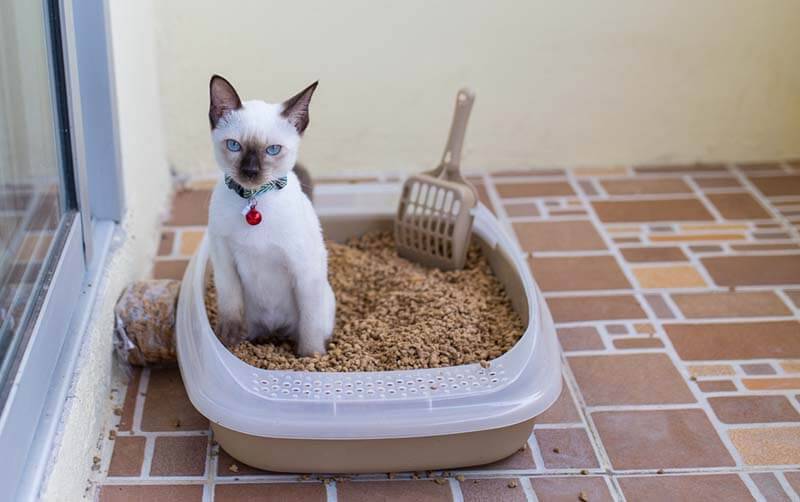
Diarrhea in black cats
Tar-like black diarrhea is called melena. Such diarrhea is a sign of bleeding in the stomach or duodenum. In this case, you may suspect that the pet has a simple or perforated ulcer. The blood in the stomach is digested by the action of gastric juice and enzymes, reaching the rectum, it acquires a rich black color. If the bleeding is severe, surgery may be required. Treatment with anti-inflammatory drugs can cause side effects in the form of stomach ulcers, which will manifest as melena. In this case, the drug must be immediately discontinued.
Diagnosis of loose stools in cats
First of all, the doctor will ask in detail about the life of the cat. It is required to study in detail what the cat is now and what he ate before, whether he receives any treats or food from the table. Whether treatments were carried out from internal parasites, with what drug and when was the last time. Has the pet been vaccinated in the last year? Does the cat have access to woolen toys, threads, does he gnaw on his toys. It is necessary to clarify whether the cat has access to the street, whether it can hunt mice. You also need to tell the doctor what medications the pet receives on an ongoing basis, whether you started giving something on your own for diarrhea. The doctor will ask how the pet feels, how many times a day there was loose stools and how it looked. It is desirable to describe its consistency, color, visible impurities. Based on the collected data, a preliminary diagnosis can be made.
Further, various tests and studies may be required to confirm the diagnosis.
A clinical blood test will show the presence of anemia or dehydration, the degree of the inflammatory process. It can also be used to suggest what process occurs in the body: bacterial, viral or parasitic.
According to a biochemical blood test, diseases of the kidneys, liver, gallbladder, pancreas can be excluded. In addition to the general biochemical analysis, it may be recommended to donate blood for species-specific pancreatic lipase, which is quite sensitive to the presence of pancreatitis in an animal.
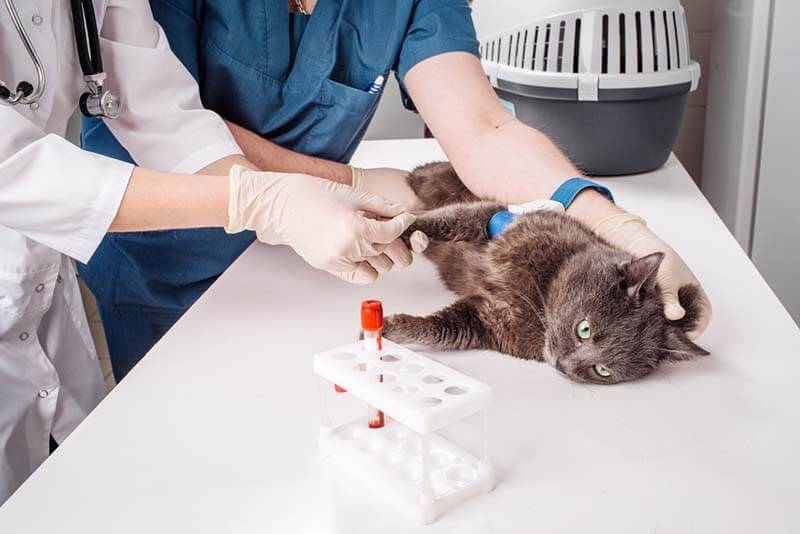
For the diagnosis of infectious diseases, polymerase chain reaction methods or serological testing can be used.
To detect parasites, a fresh stool sample is required, which is examined in a laboratory under a microscope. Helminth eggs do not leave the intestines constantly, so the result may be false negative.
Usually, a trial treatment with antiparasitic drugs is prescribed to make a diagnosis of parasitosis of the gastrointestinal tract. Success in treatment will also confirm the diagnosis.
Ultrasound examination of the abdominal cavity can reveal a pathological process in the area of uXNUMXbuXNUMXbthe internal organs. With the help of ultrasound, you can see the presence of inflammation, a foreign body, intussusception in the intestine, inflammation in the gallbladder, liver and surrounding tissues. Also, importantly, with the help of ultrasound, an oncological process can be suspected.
With the help of X-ray examination, it is also possible to exclude the presence of contrasting foreign bodies in the intestine, large neoplasms on the organs.
Endoscopic examination can help establish the diagnosis of gastritis, erosive and peptic ulcer disease. Also, using endoscopic equipment, you can take material from the intestine for histological examination.
Treatment of diarrhea in cats
Diarrhea in a cat is not yet a diagnosis, but only a symptom. To make a diagnosis and draw up a competent treatment plan, it is necessary to examine a specialist and conduct tests. The treatment of diarrhea in a cat depends on many factors, then we will look at the causes of loose stools and find out what you can do about it yourself, and what should be entrusted to the veterinarian.
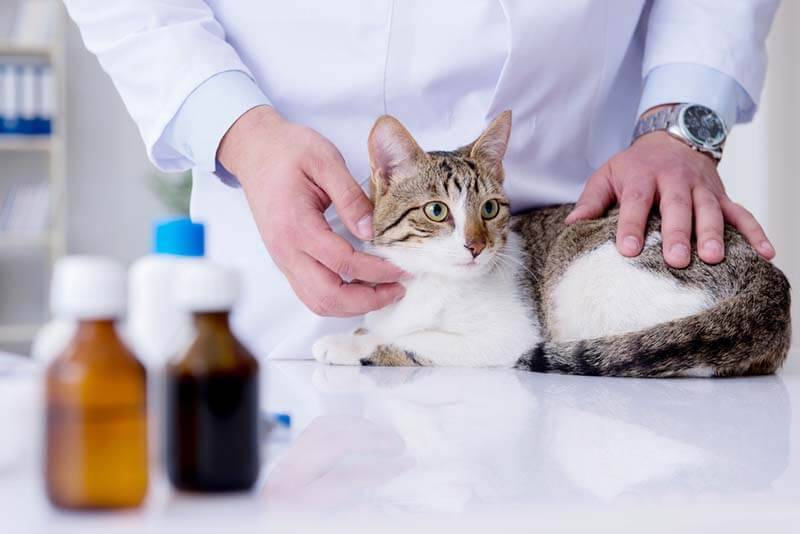
What can be done at home
The initial minimal examination of the animal can be done at home. Gently feel the cat’s stomach, it should normally be soft, and the cat should not strain and scream. You can also measure the rectal temperature with a conventional electronic thermometer. Normally, at rest, it should not exceed 39 degrees. With a strong anxiety of the cat, the temperature can reach up to 39,5 degrees. You can evaluate the color of visible mucous membranes, it is most convenient to examine the gums, they should be pink. If there are no abnormalities found in the cat, she is cheerful, cheerful, eats with appetite, but for some reason loose stools persist, you can start treating her diarrhea from home with the drugs described below.
Used medications
You can independently give enterosorbents – drugs that bind harmful and toxic substances in the intestinal lumen so that they are not absorbed into the bloodstream and remove them from the body. For example, smecta, polysorb, enterosgel are used. The dosage is selected individually, based on weight, approximately ¼ of the human dose per adult cat. Since kittens are at high risk of having helminths, you can give the kitten an antiparasitic drug for mild diarrhea. At the same time, his condition must be satisfactory. If there are any complaints, except for a slight liquefaction of the stool, it is impossible to give a drug for parasites. The same applies to adult cats, prophylactic treatment for worms can be carried out in them, provided that they are in good general health.
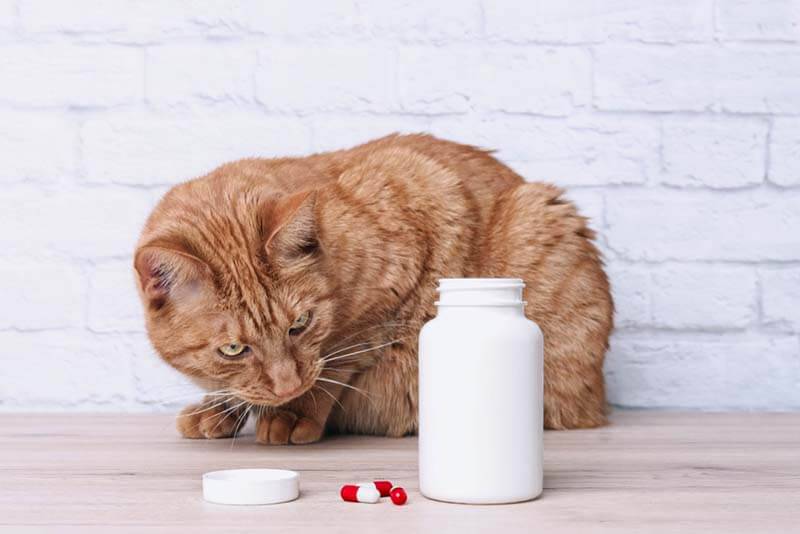
Veterinary help
If giving sorbents and antiparasitic drugs did not help, or the condition of the pet still causes concern, you cannot do without the help of a specialist. Based on the collected history and the results of the examination, the doctor will offer any additional research methods. If the cat is found to be dehydrated during examination, a venous catheter is placed and fluids are administered to restore the body’s water balance. If diarrhea is caused by an infection, then antibiotics are prescribed. In the absence of appetite, antibiotics will be in the form of injections, if the appetite is preserved, then drugs in the form of tablets can be used. If a foreign body or intestinal intussusception is found, urgent surgery is required. Liver diseases can be treated with hepatoprotectors, choleretic agents, vitamins.
What to feed a cat with diarrhea
There are special therapeutic lines of veterinary diets. For diarrhea, easily digestible, low-fat foods from the line for diseases of the stomach and intestines are often prescribed. These foods, in combination with treatment, can also quickly help to cope with loose stools. When feeding with a natural diet, it is recommended to draw up a diet together with a dietitian. Changing the usual ingredients on your own can only aggravate the situation with diarrhea. It is difficult for an inflamed stomach and intestines to absorb new foods, and with a sharp change in diet, deterioration is possible.
After diarrhea resolves, recommendations for further nutrition may vary. If the cause of diarrhea was a slight poisoning or parasite, then the doctor will recommend a gradual return to the usual food after a few weeks. If a serious illness is established and it is assumed that the course will continue in a chronic form, it is likely that a strict diet will have to be followed for life.
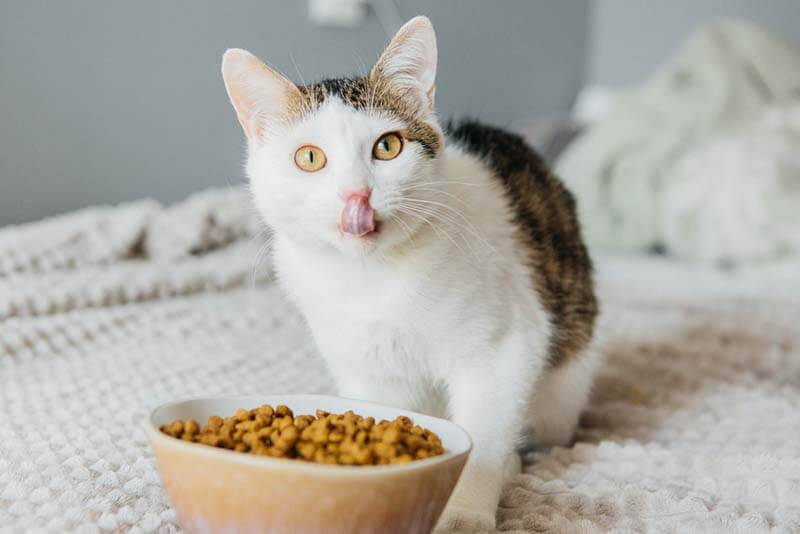
What not to do
Under no circumstances should you starve your cat. Treatment in this way with hunger is a thing of the past, and now it cannot be found in any modern recommendations. When fasting for just one day, many cats begin irreversible changes in the liver in the form of fatty hepatosis. With this disease, normal liver tissue is replaced by fatty tissue, and the functional capacity of the liver is reduced. No need to abruptly transfer the cat to a new type of food, for example, from dry food to rice. This measure can only make you feel worse, or the cat will simply refuse to eat and will starve. It is also highly discouraged to self-prescribe antibiotics, their uncontrolled use leads to the development of resistance in bacteria. Folk remedies, such as drinking vodka, yolk, manganese solution, etc. to a pet, will also only lead to negative consequences.
Prevention
In order to prevent infection of the pet with parasites, it is necessary to carry out antiparasitic treatments. For domestic cats, deworming should be done at least 2 times a year. If the pet walks, eats raw meat, then the frequency increases to 1 time in 1 – 3 months.
Annual routine vaccination can minimize the risks of contracting infectious diseases, especially in this case, protection against the feline panleukopenia virus will be important.
Cats over 7 years of age have an increased risk of developing endocrine diseases, as well as the development of diseases of the kidneys, liver, and oncology. For such animals, annual medical examinations, blood tests, and abdominal ultrasound are recommended. Medical examination allows you to identify the problem in the early stages and begin timely treatment.
High-quality balanced nutrition is half the success in good pet health.
Consultation with a veterinary nutritionist will help identify errors in feeding and correct them. Eliminating the cat stealing from the table, picking up food from the floor also reduces the risk of loose stools.
Answers to frequently asked questions





